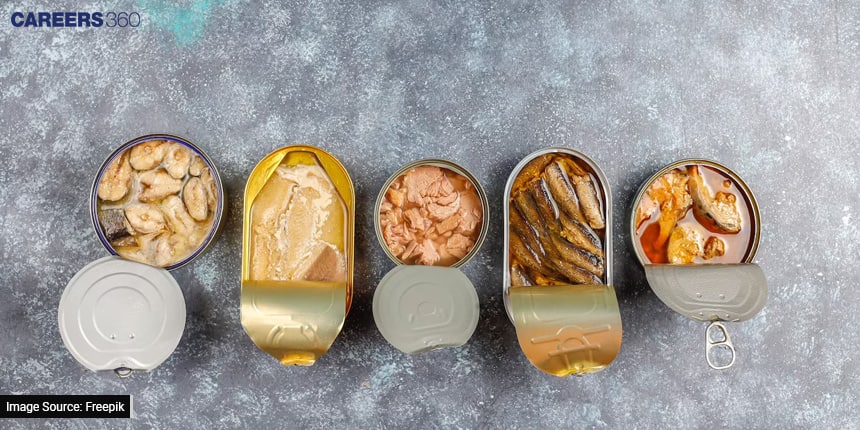What Causes Preserved Food To Get Contaminated?
Food Preservation: It becomes of utmost importance that food hygiene is maintained at all levels to ensure food safety for all consumers. Food safety and hygiene management is a set of practices that are adopted at different levels, like production, preservation, storage, and more, to prevent any type of potential hazards.
This Story also Contains
- Why Are Foods Preserved?
- Some Food Preservation Techniques
- Food Spoilage
- Spoilage of the Preserved Food

Why Are Foods Preserved?
There are some food items that can be stored for longer; however, they are processed or preserved using some techniques to increase their shelf life. The addition of preservatives or techniques like drying, canning, and so on are used to preserve food materials. So basically, the preservation of food slows down the deterioration of food quality over time.
Food preservation is done to extend the life of food items that can be spoiled or contaminated by microbes or other environmental factors. This technique also helps to eliminate germs and reduce the possibility of food deterioration and poisoning.
After food preservation, it becomes easy to store the food without the danger of contamination. Similar to how the rancidity technique oxidizes fat and causes detectable changes in taste and smell, food preservation prevents mild changes in the characteristics of the food. Therefore, food preservation prevents rancidity.
Some Food Preservation Techniques
Salting: This is one of the common methods used in households to preserve food items like meat, pickles, and more by using salt.
Sugar: Sugar is believed to be an excellent moisture absorber and is hence used in many preserved food items like jam and jellies.
Boiling and chilling: Heat and cold treatments are done to extend the food’s shelf life as sudden temperature changes eliminate the microbes and hence aid in food preservation. Cooking food is thus important so that heat kills the microbes, as raw materials tend to carry a lot of them.
Fermentation, pasteurisation, freezing, smoking, canning, and irradiation are some other techniques of food preservation.
Also check: - How Does Your Food Affect Your Mental Health
Food Spoilage
All the foods are perishable; however, some may be spoiled in a short period of time while others have a longer shelf life. Food is considered spoiled when it becomes unsuitable for consumption. Food spoilage can be characterised by changes in properties like smell and taste and changes in colour and texture. The main reason for food spoilage is contamination caused by microbes that degrades the quality of the food. Changes in oxygen, light, humidity, and other factors also cause food spoilage, which makes it poisonous for consumption and, if consumed, causes foodborne illnesses.
Food items will spoil quickly if they are not preserved properly or not preserved at all. Storing raw meat, fruit, and vegetables without proper preservation techniques will deteriorate their quality in as little as one or two days.
Spoilage of the Preserved Food
Though food preservation ensures that the foods will have a longer shelf life and can be prevented from spoilage, the techniques might not be completely successful due to other influencing factors resulting in spoilage of the preserved food. There are many reasons that could possibly cause these problems:
Some microbes are highly resistant to heat and cold temperatures, and hence they survive through preservation techniques. The microbes also go into dormancy during tough environmental conditions but start to develop again as soon as the conditions are favourable.
When preserved food is kept near non-preserved or perishable food items, there is a high chance that the preserved food will get spoilt too. This is known as cross-contamination. For example, if raw meat is kept on the top shelf of the refrigerator and water or particles drip to the lower shelves, then the food there will be contaminated.
Preservation of food is followed by appropriate food storage, failure of which will lead to food spoilage. Storing the food in high humidity or at inappropriate temperatures will likely result in food spoilage.
Food preservation techniques ensure the safety of food, but the food is handled in multiple ways, so there are high chances of its spoilage. Food safety and hygiene management look after the food's quality and preserve it with superior techniques. However, there are always chances that preserved food can get contaminated or spoiled due to careless handling, microbial spoilage, and differences in abiotic factors. One must always ensure the quality of food, and only then should it be consumed.
Also check - What Is More Important, What Do You Eat Or How Much You Eat?
Applications for Admissions are open.
As per latest syllabus. Physics formulas, equations, & laws of class 11 & 12th chapters
JEE Main Important Chemistry formulas
Get nowAs per latest syllabus. Chemistry formulas, equations, & laws of class 11 & 12th chapters
JEE Main high scoring chapters and topics
Get nowAs per latest 2024 syllabus. Study 40% syllabus and score upto 100% marks in JEE
JEE Main Important Mathematics Formulas
Get nowAs per latest syllabus. Maths formulas, equations, & theorems of class 11 & 12th chapters
